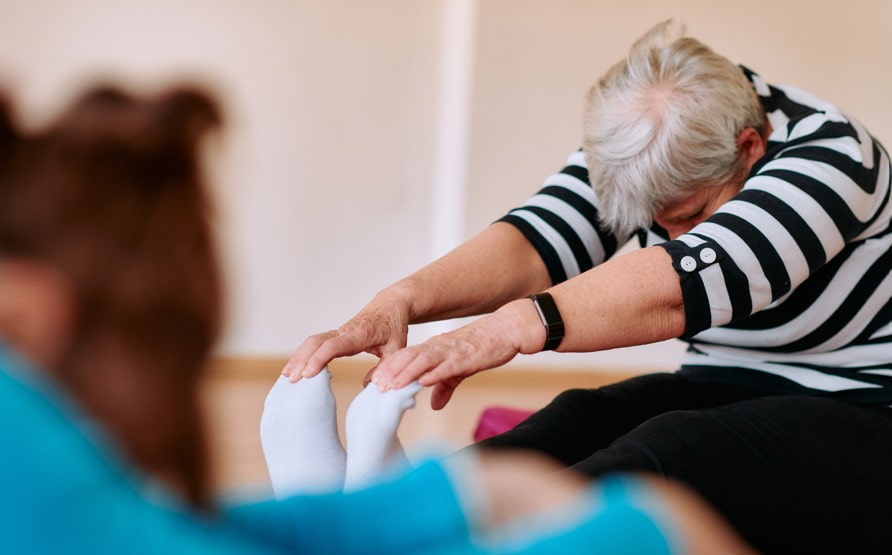Why Flexibility Matters More Than You Think After 60
What if your body could move like it used to smoothly, easily, without that morning stiffness?
That’s what flexibility really is: freedom of movement, not just the ability to touch your toes.
Here’s why it matters (and why it’s worth ten minutes of your day):
It prevents falls.
When your joints and muscles are flexible, your reflexes are quicker. A small slip doesn’t become a big accident.
It keeps your blood flowing.
Stretching acts like a gentle wake-up call for your circulatory system. More oxygen, more energy, better focus.
It improves posture and mood.
Think of your spine as your inner antenna. When it’s aligned and mobile, your brain receives clearer signals.
It gives you independence.
Reaching a shelf, tying shoes, or stepping into the shower—all these daily movements depend on flexibility.
💡 Fun fact: Studies show that seniors who stretch at least three times a week have 30% fewer mobility-related issues than those who stay sedentary.
Ask yourself:
When was the last time you stretched without rushing?
How would it feel to start your day feeling loose instead of tight?
Small actions—like rotating your ankles while brushing your teeth—can be the beginning of a new rhythm. You don’t need a gym. You need a decision.

The Science Behind Flexible Aging
-
Neurotransmitters awaken.
Dopamine and serotonin rise, creating that post-yoga calm. Synovial fluid increases.
It’s the natural “oil” in your joints, reducing friction and pain.Circulation improves.
Fresh blood brings nutrients that repair micro-tears in muscles.
- Before breakfast, roll your shoulders 10 times.
- Rotate your wrists and ankles.
- Then sit for a moment and notice—how awake does your body feel now?
Your 10-Minute Daily Flow: Gentle Techniques That Wake Up the Body and Calm the Mind
You don’t need fancy equipment to keep your body agile. Just a chair, a quiet space, and curiosity about how movement feels today. Ten minutes can reconnect you with your body in ways medication never will. Think of it as your daily tune-up.
Let’s move together.
🧘♀️ 1. Seated Spinal Twist
Sit on a sturdy chair. Keep your feet flat and your spine long. Gently turn your torso to one side, holding the back of the chair for support. Breathe in through your nose, out through your mouth.
Hold for 20 seconds, then switch sides.
This simple twist massages your lower back and wakes up the muscles that help you stay upright. You might even feel a light release between your shoulder blades—a small sigh of relief from your spine.
Try it right after waking up. It tells your nervous system: “I’m ready for the day.”
🦶 2. Ankle Circles
Lift one foot slightly off the floor and rotate your ankle slowly. Five circles clockwise, five counterclockwise.
Repeat with the other foot.
This move keeps your ankles mobile, which is crucial for balance. Many falls begin with a stiff ankle, not a weak leg.
Notice the soundless rhythm of the movement. You’re improving your coordination and circulation at once.
If you’re reading or watching TV, sneak in a few circles. It counts.
🦵 3. Leg Extensions
While seated, straighten one leg and lift it slightly. Hold for five seconds, then lower.
Alternate between legs 10 times each.
This exercise activates the quadriceps—those strong front muscles that help you climb stairs and stand from a chair.
To make it more engaging, pair it with breathing: inhale as you lift, exhale as you lower. It keeps your mind present.
If you feel your muscles trembling a bit, smile. That’s progress talking.
🤲 4. Shoulder Rolls
Sit or stand tall. Circle your shoulders forward, then backward, in smooth slow motions.
Five times each direction.
This technique relieves tension from long hours reading, cooking, or looking down at a phone. When the shoulders open, the chest expands, and breathing deepens naturally.
If you want a small challenge, close your eyes and synchronize the rolls with music you love. You’ll start feeling the movement as a form of self-expression, not exercise.
🪷 5. Gentle Forward Bend
From a seated position, inhale and stretch your arms up. Exhale slowly as you fold forward, letting your hands rest on your knees, shins, or ankles—wherever they comfortably reach.
Let your head hang, releasing all the mental noise.
Hold for 20 seconds, breathing deeply.
This posture increases blood flow to the brain and relaxes the spine. When you rise back up, do it vertebra by vertebra, as if you were rebuilding your posture with care.
If you feel a bit dizzy afterward, pause and smile. That’s oxygen reaching every corner.
Keeping It Safe, Gentle, and Enjoyable
Flexibility thrives on patience. The body learns through kindness, not force.
Here are a few ways to make this ritual last beyond a week:
🪞 Listen to your body.
If something feels sharp, stop. If it feels like gentle resistance, breathe through it. Progress should never hurt.
🪑 Use your surroundings.
A chair, wall, or counter is your best ally. Support keeps you confident and relaxed.
🎵 Add joy.
Put on a playlist you love—classical, jazz, or lo-fi beats. Ten minutes with music can feel like meditation.
👫 Invite someone.
Doing this with a friend or neighbor turns movement into connection. You’ll both show up more consistently.
📅 Be regular, not perfect.
Missing a day doesn’t erase the benefits. Consistency over time builds the body’s memory for fluidity.

A Community That Moves With You
Every stretch you do tells your body, “You’re still capable.”
Every breath you take during those ten minutes reminds your mind, “You’re still here, still growing.”
What would happen if every day started with a stretch, a laugh, or a walk by the lake?
At Lake Howard Heights, movement happens naturally. Some residents join morning chair yoga. Others prefer a stroll through the courtyard with their pet or light stretches before lunch. The point isn’t perfection—it’s rhythm.
Flexibility grows here because life keeps inviting you to move.
Our team offers guided activities that strengthen muscles and lift spirits. Balance sessions, breathing exercises, gentle stretching… every small action reminds the body that it’s alive.
Need a helping hand? Licensed nurses and associates are nearby, 24/7. You can relax knowing care is close, while Curana Health’s onsite primary care services bring medical attention right to your apartment when needed.
Then come the other rituals of well-being: a meal shared with friends, a movie in the theater room, a walk at sunset by the lake. Every detail—fresh air, food, laughter—supports the same idea: your body and mind work better when they move together.
Ask yourself:
How would your days feel if movement became part of your joy instead of your to-do list?
You can explore that feeling here, one stretch, one laugh, one step at a time.






